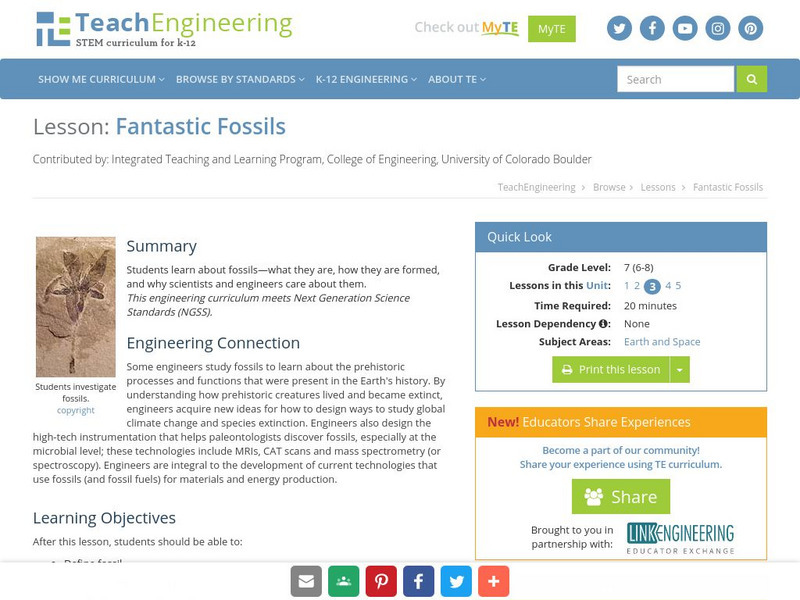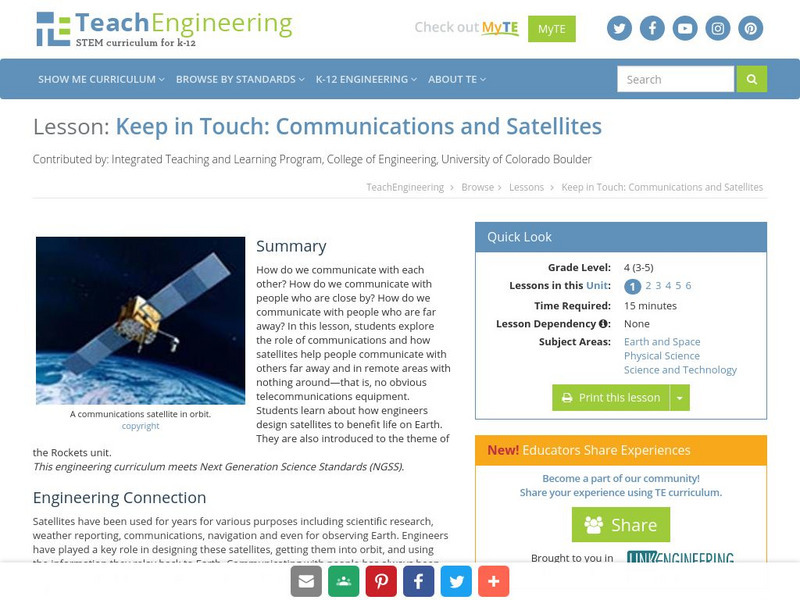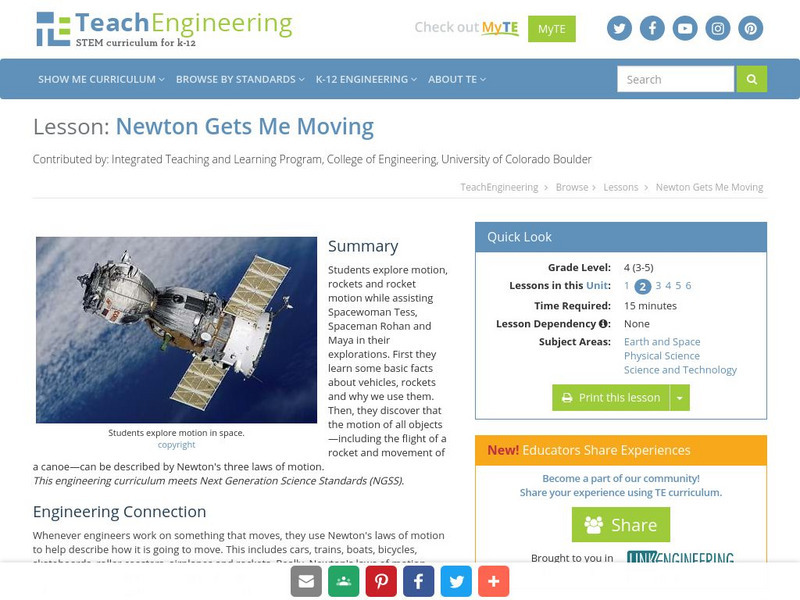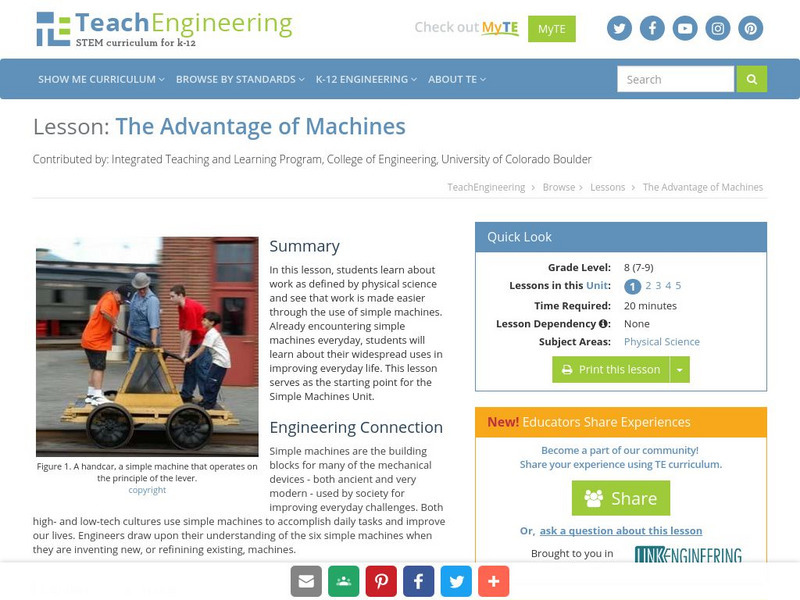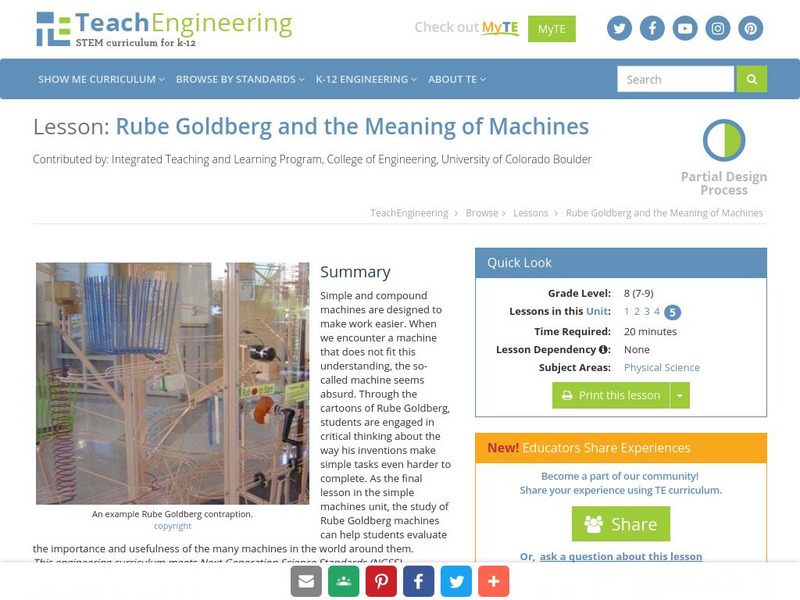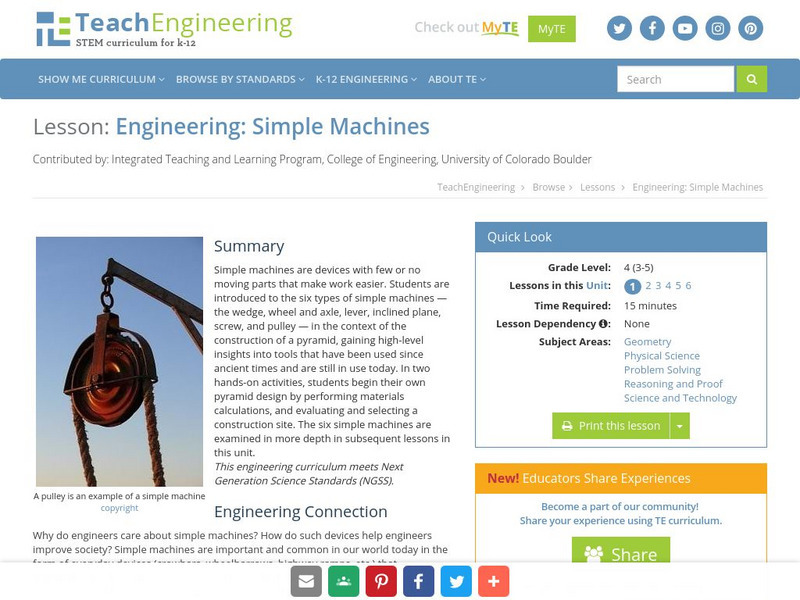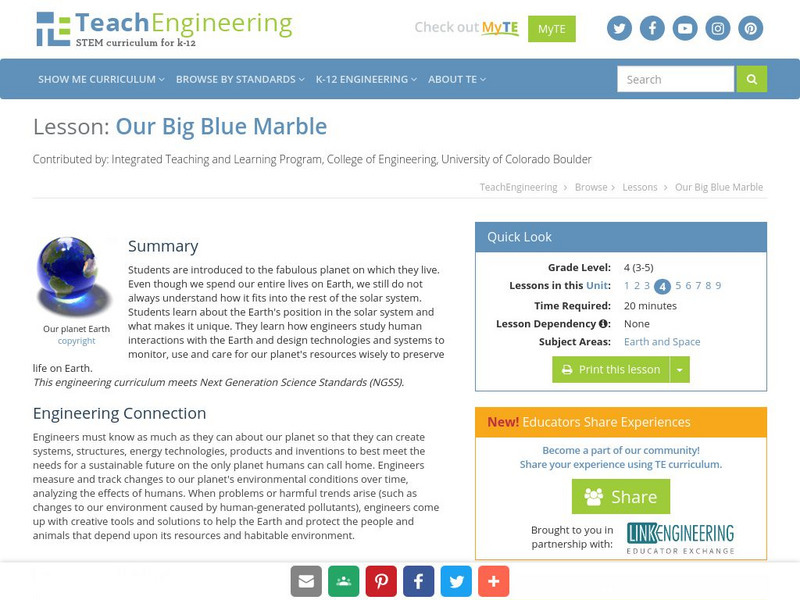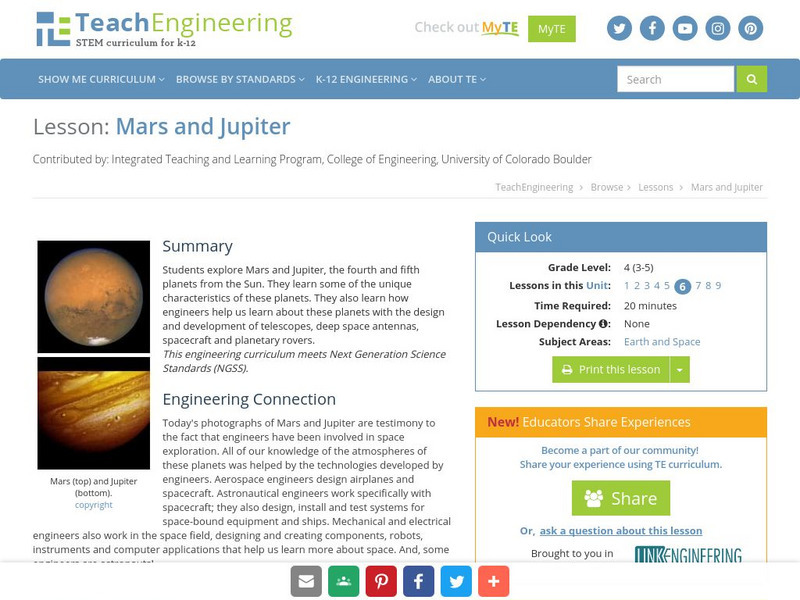TeachEngineering
Teach Engineering: Rock Solid
Rocks cover the earth's surface, including what is below or near human-made structures. With rocks everywhere, breaking rocks can be hazardous and potentially disastrous to people. Students are introduced to three types of material...
TeachEngineering
Teach Engineering: Fantastic Fossils
Learners learn about fossils - what they are, how they are formed, and why scientists and engineers care about them.
TeachEngineering
Teach Engineering: Keep in Touch: Communications and Satellites
How do we communicate with each other? How do we communicate with people who are close by? How do we communicate with people who are far away? In this lesson, learners will explore the role of communications and how satellites help...
TeachEngineering
Teach Engineering: Newton Gets Me Moving
In this instructional activity, students will explore motion, rockets and rocket motion while assisting Spacewoman Tess, Spaceman Rohan and Maya in their explorations. They will first learn some basic facts about vehicles, rockets and...
TeachEngineering
Teach Engineering: Rocket Me Into Space
One of the exciting challenges for engineers is the idea of exploration. This instructional activity looks more closely at Spaceman Rohan, Spacewoman Tess, their daughter Maya, and their challenges with getting to space, setting up...
TeachEngineering
Teach Engineering: Blast Off
Rockets need a lot of thrust to get into space. In this lesson, students learn how rocket thrust is generated with propellant. The two types of propellants are discussed and relation to their use on rockets is investigated. Students...
TeachEngineering
Teach Engineering: Learn to Build a Rocket in 5 Days or Your Money Back
In this lesson, students discover the entire process that goes into designing a rocket for any customer. In prior lessons, students learned how rockets work, but now they learn what real-world decisions engineers have to make when...
TeachEngineering
Teach Engineering: Where Am I: Navigation and Satellites
How do we know where we are? In this lesson, students explore the concept of triangulation that is used in navigation satellites and global positioning systems designed by engineers. Also, students learn how these technologies can help...
TeachEngineering
Teach Engineering: The Advantage of Machines
In this lesson, students learn about work as defined by physical science and see that work is made easier through the use of simple machines. Already encountering simple machines everyday, students will be alerted to their widespread...
TeachEngineering
Teach Engineering: Rube Goldberg and the Meaning of Machines
Simple and compound machines are designed to make work easier. When we encounter a machine that does not fit this understanding, the so-called machine seems absurd. In this lesson plan, the cartoons of Rube Goldberg are introduced and...
TeachEngineering
Teach Engineering: Engineering: Simple Machines
Simple machines are devices with few or no moving parts that make work easier. Students are introduced to the six types of simple machines - the wedge, wheel and axle, lever, inclined plane, screw, and pulley - in the context of the...
TeachEngineering
Teach Engineering: Pyramid Building: How to Use a Wedge
Students learn how simple machines, including wedges, were used in building both ancient pyramids and present-day skyscrapers. In a hands-on activity, students test a variety of wedges on different materials (wax, soap, clay, foam)....
TeachEngineering
Teach Engineering: Let's Move It!
Students explore methods employing simple machines likely used in ancient pyramid building, as well as common modern-day material transportation. They learn about the wheel and axle as a means to transport materials from rock quarry to...
TeachEngineering
Teach Engineering: Slide Right on by Using an Inclined Plane
Students explore building a pyramid, learning about the simple machine called an inclined plane. They also learn about another simple machine, the screw, and how it is used as a lifting or fastening device. During a hands-on activity,...
TeachEngineering
Teach Engineering: Powerful Pulleys
Young scholars continue to explore the story of building a pyramid, learning about the simple machine called a pulley. They learn how a pulley can be used to change the direction of applied forces and move/lift extremely heavy objects,...
TeachEngineering
Teach Engineering: Simple Machines and Modern Day Engineering Analogies
Students apply the mechanical advantages and problem-solving capabilities of six types of simple machines (wedge, wheel and axle, lever, inclined plane, screw, pulley) as they discuss modern structures in the spirit of the engineers and...
TeachEngineering
Teach Engineering: Destination Outer Space
Students acquire a basic understanding of the science and engineering of space travel as well as a brief history of space exploration. They learn about the scientists and engineers who made space travel possible and briefly examine some...
TeachEngineering
Teach Engineering: Blazing Gas
Students are introduced to our Sun as they explore its composition, what is happening inside it, its relationship to our planet (our energy source), and the ways engineers help us learn about it.
TeachEngineering
Teach Engineering: Mercury and Venus
Students explore Mercury and Venus, the first and second planets nearest the Sun. They learn about the planets' characteristics, including their differences from Earth. Students also learn how engineers are involved in the study of...
TeachEngineering
Teach Engineering: Our Big Blue Marble
Young scholars are introduced to the fabulous planet on which they live. Even though we spend our entire lives on Earth, we still do not always understand how it fits into the rest of the solar system. Students learn about the Earth's...
TeachEngineering
Teach Engineering: Moon Walk
Students learn about the Earth's only natural satellite, the Moon. They discuss the Moon's surface features and human exploration. They also learn about how engineers develop technologies to study and explore the Moon, which also helps...
TeachEngineering
Teach Engineering: Mars and Jupiter
Students explore Mars and Jupiter, the fourth and fifth planets from the Sun. They learn some of the unique characteristics of these planets. They also learn how engineers help us learn about these planets with the design and development...
TeachEngineering
Teach Engineering: The Outer Planets
Young scholars explore the outermost planets of our solar system: Saturn, Uranus and Neptune. They also learn about characteristics of Pluto and its interactions with Neptune. Students learn a little about the history of space travel as...
TeachEngineering
Teach Engineering: Life in Space: The International Space Station
Students are introduced to the International Space Station (ISS) with information about its structure, operation and key experiments. The ISS itself is an experiment in international cooperation to explore the potential for humans to...

